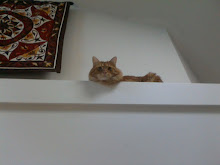*
So my question is, how many gamers have actually taken part in a seige game? Did you fight it out on the tabletop, or reduce everything to maps, plans and the abstract? Inquiring minds need to know...
Being an account of the doings in the Grand Duchy of Hetzenberg & environs.



 Today's snapshot of the Markgraaf's army depicts the Guard Artillery. Composed of 12- pounder guns and 7" howitzers, it's the heavy-hitter on the battlefield. Although too small to represent in this scale of image, the gun crews wear a silver roundel on their tricorn representing a cannonball; those of the howitzer detachment have the badge of a pewter "grenade, fired proper."
Today's snapshot of the Markgraaf's army depicts the Guard Artillery. Composed of 12- pounder guns and 7" howitzers, it's the heavy-hitter on the battlefield. Although too small to represent in this scale of image, the gun crews wear a silver roundel on their tricorn representing a cannonball; those of the howitzer detachment have the badge of a pewter "grenade, fired proper."  The artillery is the most professional body of troops in the Markgraaf's army. Although a relatively small corps it is well armed with 6-pounder cannon for the line battery, 12-pounder cannon and 7" howitzers for the Guard. The image above is for the line battery, Countess Erzebet von Neuman's Honorable Artillery Company. All ordinance is painted blood red.
The artillery is the most professional body of troops in the Markgraaf's army. Although a relatively small corps it is well armed with 6-pounder cannon for the line battery, 12-pounder cannon and 7" howitzers for the Guard. The image above is for the line battery, Countess Erzebet von Neuman's Honorable Artillery Company. All ordinance is painted blood red.
 By request, the flag of Babbington's Legion. It follows the family's armorial design and colors of red and silver. The motto translates from the original French as "Faith is everything."
By request, the flag of Babbington's Legion. It follows the family's armorial design and colors of red and silver. The motto translates from the original French as "Faith is everything."